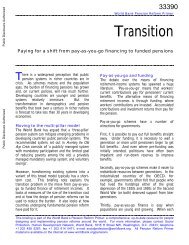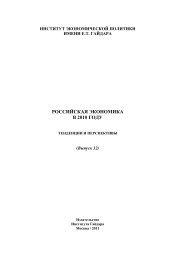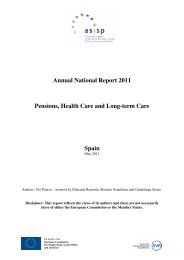Financial Sector Development in Africa: Opportunities ... - World Bank
Financial Sector Development in Africa: Opportunities ... - World Bank
Financial Sector Development in Africa: Opportunities ... - World Bank
Create successful ePaper yourself
Turn your PDF publications into a flip-book with our unique Google optimized e-Paper software.
48 Porteous<br />
offer an Internet channel. However, the functionality of mobile (and<br />
Internet) bank<strong>in</strong>g is often very restricted; for example, <strong>in</strong> many cases,<br />
customers can only obta<strong>in</strong> balance <strong>in</strong>formation or transactional alerts<br />
but cannot make payments. A few banks, however, chose a more aggressive<br />
path.<br />
First National <strong>Bank</strong> (FNB), a large retail bank <strong>in</strong> South <strong>Africa</strong>, is widely<br />
recognized as hav<strong>in</strong>g a successful and profitable mobile channel that was<br />
launched <strong>in</strong> 2005. By 2010, the bank reported some 2 million active<br />
mobile customers, a significant proportion of its retail customer base.<br />
FNB had adopted an explicit strategy of migrat<strong>in</strong>g marg<strong>in</strong>al customers<br />
(whom it could not serve profitably us<strong>in</strong>g conventional bank channels<br />
such as branches or even automated teller mach<strong>in</strong>es, or ATMs) to the<br />
mobile as their ma<strong>in</strong> bank<strong>in</strong>g channel. FNB’s profitability comes ma<strong>in</strong>ly<br />
from the commission that FNB receives from MNOs each time its clients<br />
buy prepaid airtime directly from their bank accounts. Other banks <strong>in</strong><br />
South <strong>Africa</strong> have pursued similar strategies, result<strong>in</strong>g <strong>in</strong> twice as many<br />
South <strong>Africa</strong>ns (30 percent of the banked population) us<strong>in</strong>g mobile bank<strong>in</strong>g<br />
than use Internet bank<strong>in</strong>g. However, FNB’s success came <strong>in</strong> the relatively<br />
well-developed retail bank<strong>in</strong>g environment of a middle-<strong>in</strong>come<br />
country <strong>in</strong> which half the adult population was already banked. Also,<br />
access to cash-handl<strong>in</strong>g channels such as ATMs or po<strong>in</strong>ts of sale was widespread<br />
<strong>in</strong> urban areas <strong>in</strong> that country, so FNB did not have to build new<br />
channels for mobile usage. While a number of banks entered mobile<br />
bank<strong>in</strong>g <strong>in</strong> this first generation, FNB stands out for its focus on this<br />
channel, and for its success.<br />
Second-generation providers had to go further. They sought to provide<br />
electronic payment services <strong>in</strong> countries such as Zambia, which<br />
lacked electronic payment <strong>in</strong>frastructure. The need to f<strong>in</strong>d cheaper and<br />
more effective ways of sell<strong>in</strong>g prepaid airtime was an early driver for<br />
MNOs because distribut<strong>in</strong>g physical scratch cards was more expensive<br />
and risky than sell<strong>in</strong>g airtime as a digital good (digital airtime could be<br />
bought <strong>in</strong> smaller quantities, which made it more accessible for poorer<br />
customers). Distribut<strong>in</strong>g airtime <strong>in</strong> this way necessitated a cost-effective<br />
payment solution. An electronic wallet offered promise: it could be<br />
stocked with money deposited via agents, and then the money could<br />
easily be transferred at the push of a few buttons either to purchase digital<br />
goods (predom<strong>in</strong>antly airtime) or to send remittances.<br />
This latter usage, person-to-person transfers, was an important driver<br />
<strong>in</strong> the launch of mobile f<strong>in</strong>ancial services <strong>in</strong> the Philipp<strong>in</strong>es <strong>in</strong> 2001.<br />
The Philipp<strong>in</strong>es is a large country with many rural and remote areas







